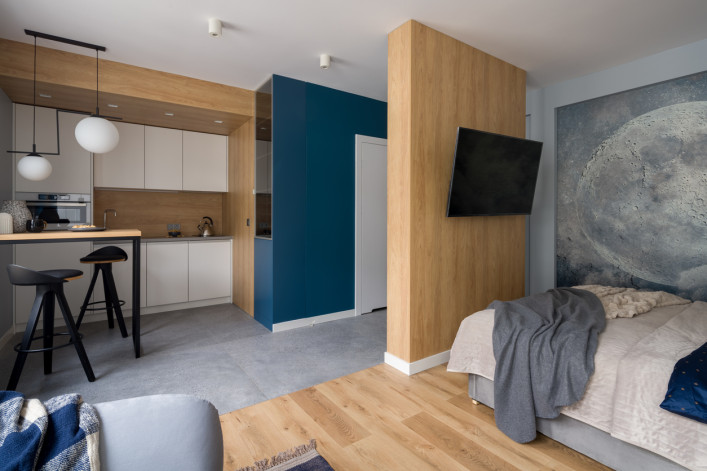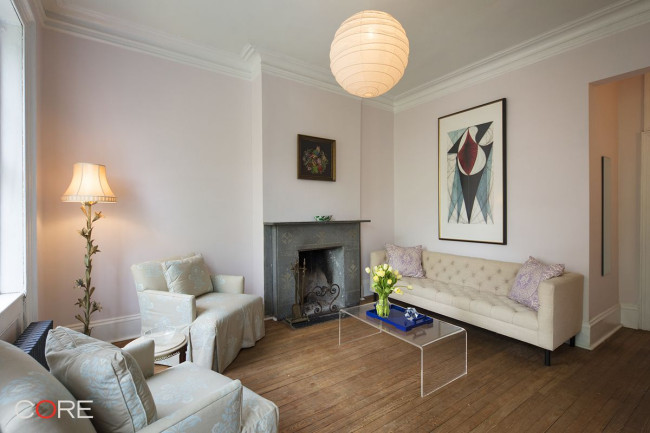Should I stretch my budget for a one bedroom or save with a studio?
- Renters and buyers pay significantly less for studio apartments vs. one bedrooms
- But a small space is challenging if you work from home or live with a partner

A studio can help you stretch your budget into a neighborhood or fully amenitized building where you wouldn’t be able to afford a larger apartment.
iStock
I'm on a budget. Should I play it safe and stick to a studio apartment or is living in one room too challenging? Is a one bedroom worth the extra money?
Whether you are buying or renting, it can make a lot of sense to opt for a studio over a one bedroom, especially when living solo. A studio is typically much less expensive and that can help you stretch your budget into a neighborhood or fully amenitized building where you wouldn’t be able to afford a larger apartment.
Still, there are lots of challenges when it comes to living in a studio—namely not much room for your stuff, let alone a significant other. It is not likely to be a forever home, so you have to think about resale value (if buying) and whether the costs associated with moving again and redecorating in a relatively short time frame are worth it, according to our experts.
Considerations if you’re leaning toward a studio
Regardless of whether you choose a studio or one bedroom, you’ll be paying a premium to avoid having roommates, since your housing dollars go much farther when you share a larger apartment. Of course, having roommates comes with a different set of headaches.
Still, some studios can function like a one bedroom, since not all studios have the same footprint, pointed out Nicole Beauchamp, a broker at Sotheby’s International Realty. An alcove studio can give you the privacy, if not the square footage, of a one bedroom.
Beauchamp recommends paying close attention to a studio’s floor plan and taking careful measurements in person to see if your current furniture will work. You’ll also want to see whether you can set up the apartment to optimize the space with built-ins and a Murphy bed.
“This may not be a forever home so it is wise to consider the design elements for what might appeal to a future owner and position it for optimal resale,” Beauchamp said. “Usually we look at the location of the kitchen and bathroom and think about how the functionality of the space would work.”
What if I meet someone?
One consideration that may give you pause: A studio may be a good fit for you when you’re single, but what happens if you meet someone and it gets serious?
Beauchamp said to cross that bridge when you get to it.
“Something I have often told clients: Thinking of the future is important but don't let a situation you aren't in stop you from making a decision,” she said.
A couple living in a studio
As it turns out, that was my experience. I met my future husband when I was living in a 416-square-foot studio that I owned. It was in a great Manhattan neighborhood, just blocks from where my then-boyfriend was attending graduate school, so he moved in with me, and we lived there through our first year of marriage (we had to store all our wedding gifts).
Living in a tiny place was a good test of our relationship: Anytime we wanted to buy something, we had to discuss what to get rid of to make room for it—a classic NYC negotiation. I like to think living in those close quarters set us up for success later as a married couple.
Rents and prices for studios vs. one bedrooms
Here’s a sense of how much you could save based on recent market snapshots from the Elliman Report: The median rent in April for a Manhattan studio was $3,250 vs. $4,374 for a one bedroom. In Brooklyn, it was $2,983 vs. $3,268. Here’s a surprise: In Queens, the median rent for a new lease for a one bedroom ($2,975) was cheaper than a studio ($3,083).
For buyers in the first quarter, Manhattan co-op studios had a median sales price of $420,00 vs. $730,000 for a one bedroom. Studio condos had a median price of $631,315 vs. $1,067,192 for a one bedroom, according to the Elliman Report.
If you’re leaning toward a one bedroom
One bedrooms can give you more privacy for working from home or when you have guests over and they’re easier to decorate, since you have more walls to help you define your space. But you don’t necessarily have more square footage.
For some renovated and new construction apartments, you may find developers shortchange the living room, because there are no minimum size requirements for living rooms like there are for legal bedrooms.
Job security is another consideration: Could you pay a heftier rent or mortgage plus monthly fees for a one bedroom out of your savings if you suddenly lost your job?
Putting up a wall
There is another strategy that New Yorkers employ to combine the affordability of a studio with the privacy of a one bedroom: Put up a wall to create a room.
A temporary pressurized wall—not permanently attached to existing walls or floor and doesn't interfere with the ventilation or sprinkler systems or block exit routes—is a popular strategy to add a legal bedroom.
If you go this route, you need to follow the rules so be sure to get approval from a landlord or property manager. And because adding a temporary pressurized wall can change an apartment’s layout, you may need to get a permit from the Department of Buildings. Brick Underground has a detailed guide on what you need to know about using a pressurized wall to create a bedroom.
So here’s a tip for apartment hunters: Ask your broker to find out whether other studio renters or owners have successfully put up pressurized walls to create a bedroom.
Trouble at home? Get your NYC apartment-dweller questions answered by an expert. Send your questions to experts@brickunderground.com.
You Might Also Like































